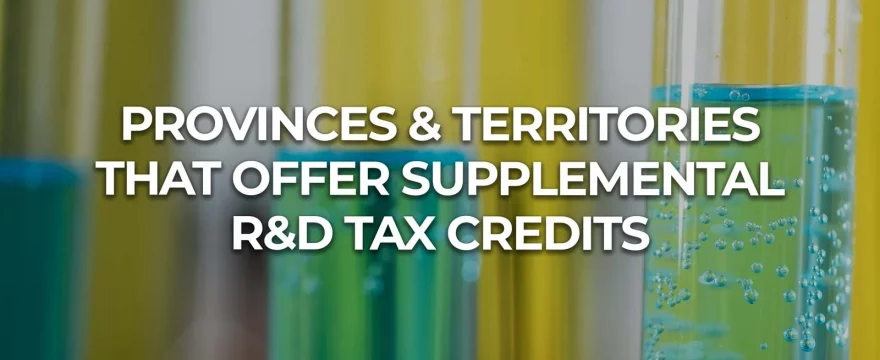
The Scientific Research and Experimental Development (SR&ED) program stands as the largest federal source of financial support for research and development (R&D), delivering over $3 billion in tax incentives to more than 16,000 claimants each year. However, the program is not the only source of R&D tax credits for businesses — several Canadian provinces also issue R&D tax credits on the provincial level.
Quebec
Quebec provides refundable tax credits to businesses operating in Canada that perform SR&ED eligible work within the province. Additionally, it offers the highest provincial refund rate to innovative companies at 30%. Your organization may receive R&D tax credits in Quebec for the following expenses:
- Research carried out at a university, by a public research center, or by a research consortium
- Private partnership pre-competitive research
- Research consortium dues and fees
- Salaries and wages for R&D workers
Canadian businesses operating in Quebec should visit the Revenu Quebec website to determine if they meet the necessary criteria.
Ontario
In Ontario, businesses can claim a non-refundable tax credit on eligible SR&ED expenses conducted in the province. To qualify, companies must have a permanent establishment in Ontario and carry out SR&ED activities during the tax year. They must also be eligible to claim the federal investment tax credit (ITC) and be subject to corporate income tax. Additionally, they need to file an SR&ED expenditures claim on federal form T661.
British Columbia
British Columbia extends tax credits for businesses that perform SR&ED in the province. Qualifying organizations that are Canadian-controlled private corporations (CCPCs) may claim a refundable tax credit up to 10% of expenses within the expenditure limit. CCPCs with costs that exceed the expenditure limit and other eligible companies may also claim a non-refundable tax credit in British Columbia.
New Brunswick
Administered by the Canada Revenue Agency (CRA), this fully refundable tax credit helps New Brunswick businesses fund research efforts by refunding 15% of eligible expenditures. Corporations can apply this credit to the SR&ED expenses laid out in the Federal Income Tax Act. Eligible expenditures for New Brunswick R&D tax credits include:
- Applied research
- Basic research
- Experimental development
- Support work
Nova Scotia
Companies operating in Nova Scotia may be eligible to receive SR&ED tax credits from the province. The provincial refundable rate is 15%. Nova Scotia follows the eligibility requirements of the federal SR&ED program to determine qualifying expenses.
Manitoba
Membership partners, trust beneficiaries, and corporations operating alone can obtain Manitoba R&D tax credits. These businesses must also have permanent holdings in Manitoba and perform SR&ED in the province. Eligible expenses under this tax credit align with those stated in the federal SR&ED ITC.
The Manitoba R&D tax credit is fully refundable at 15% of eligible expenditure when the work is carried out under a contract with a qualifying research institute. If the business does not complete the R&D work under an eligible contract with an institute, half of the tax credit is refundable and the remainder is non-refundable.
Saskatchewan
Saskatchewan offers a tax credit to promote more R&D investment in the private sector. To qualify, businesses in the province must incur eligible R&D expenditures. CCPCs can attain refundable R&D tax credits for up to 10% of expenses under the expenditure limit. Corporations that exceed this limit may receive a 10% non-refundable R&D tax credit.
Alberta
Unlike many other provincial R&D tax credits, the Alberta R&D incentive is not administered by the CRA. Instead, the Alberta Ministry of Finance and Enterprise issues a refund on eligible expenditure in the form of a grant called the Innovation Employment Grant. Qualifying corporations that incur eligible expenditures receive a payment of 8% of costs categorized under their base level of spending and an enhanced 20% payment on costs that exceed their base level of spending. The firm’s base level of spending is calculated by averaging their qualifying R&D spend over the last two years.
Newfoundland and Labrador
This province offers an R&D tax credit to any taxpayer, whether an individual or a business. Corporations eligible to receive these tax incentives include trust beneficiaries and partnership members. Qualifying organizations and individuals must also carry out SR&ED in Newfoundland and Labrador, and have a permanent establishment in the province.
Eligible work and expenditures align with the guidelines for the federal SR&ED ITC. Additionally, this tax credit is fully refundable at a 15% rate for qualified expenses.
Yukon
Some innovative companies may also access tax credits when operating in Canadian territories, such as the Yukon. Individuals and companies, including partnership members and trust beneficiaries, can access the Yukon R&D tax credit. Eligible corporations must have a permanent location in the Yukon and conduct SR&ED in the territory.
The Yukon R&D tax credit is refundable at a 15% rate for qualifying costs. Businesses may also receive an additional 5% refund on expenses paid or payable to the Yukon College. Eligible work and expenditures reflect those for the federal SR&ED ITC.
Accelerate Your SR&ED Refund with Easly Advances
Although the SR&ED tax incentive program is the biggest government funding source for Canadian R&D, these credits are not always easy to access. For example, your business can obtain SR&ED refunds only in the tax year after it incurs eligible expenses. Businesses can access their refunds much sooner by advancing them with Easly.
Access on-demand, non-dilutive funding through our online Capital-as-a-Service platform.
Contact us today to learn more about financing SR&ED tax credits for your Canadian business.
.png)
.png)
.png)
